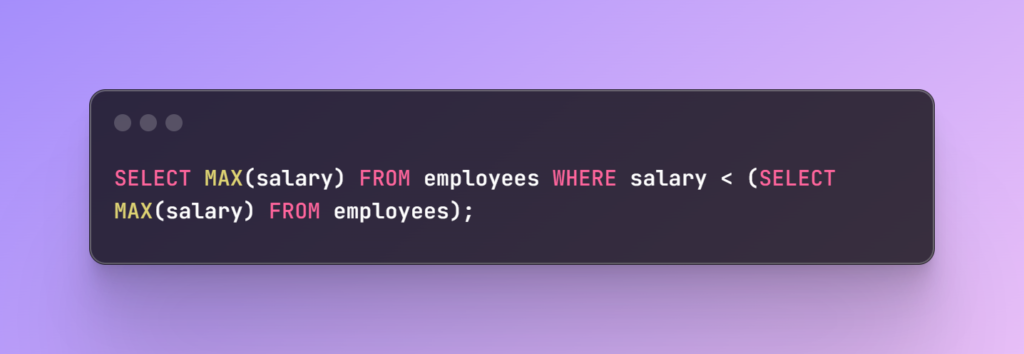Introduction:
As a professional with around three years of experience in the realm of database management, your journey has likely been marked by a continual quest for optimizing queries, ensuring data integrity, and mastering the nuances of SQL. As you step into the interview room, equipped with a wealth of practical knowledge, it’s crucial to be prepared for questions that delve into the intricacies of database design, query optimization, and transaction management. In this blog, we explore 15 SQL interview questions tailored for individuals with approximately three years of hands-on experience. Each question is crafted to assess not just theoretical knowledge but also the practical application of SQL concepts. Whether you’re looking to solidify your expertise or preparing for a job transition, these questions serve as a valuable resource to showcase your proficiency in the world of relational databases.
SQL Interview Questions For 3 Years Experience

1. What is the difference between INNER JOIN and LEFT JOIN in SQL?
INNER JOIN returns only the matching rows from both tables, while LEFT JOIN returns all rows from the left table and matching rows from the right table.
2. Explain the purpose of the GROUP BY clause in SQL.
The GROUP BY clause is used to group rows that have the same values in specified columns into summary rows, like finding the total sales per category.
3. How do you optimize a SQL query?
Optimization techniques include indexing, avoiding SELECT * to fetch only needed columns, using appropriate WHERE clauses, and optimizing joins.
4. What is a subquery, and how is it different from a JOIN?
A subquery is a query nested within another query, while a JOIN combines rows from two or more tables based on a related column between them.
5. What is the purpose of the HAVING clause?
The HAVING clause is used in conjunction with the GROUP BY clause to filter the results of a GROUP BY based on a specified condition.
6. Explain the difference between UNION and UNION ALL.
UNION combines the results of two SELECT statements and removes duplicates, while UNION ALL combines results without removing duplicates.
7. How do you prevent SQL injection in your queries?
To prevent SQL injection, use parameterized queries (prepared statements) or stored procedures instead of concatenating user inputs directly into SQL statements.
8. What is normalization in database design, and why is it important?
Normalization is the process of organizing data to eliminate redundancy and improve data integrity. It is important for efficient storage and maintenance of data.
9. Explain the difference between a primary key and a unique key.
A primary key uniquely identifies a record in a table and cannot have NULL values. A unique key also enforces uniqueness but allows NULL values.
10. What is the purpose of the SQL CASE statement?
The CASE statement is used to perform conditional logic in SQL queries, similar to the IF-ELSE structure in other programming languages.
11. What is an index in a database, and how does it improve performance?
An index is a data structure that improves the speed of data retrieval operations on a database table. It works by creating a pointer to the data in the table.
12. What are stored procedures, and how are they beneficial?
Stored procedures are precompiled SQL code that can be stored and executed on the database. They improve performance, security, and code reusability.
13. How can you find the second highest salary in a table?
Use the following SQL query:

14. What is a foreign key, and how is it used in database relationships?
A foreign key is a field that refers to the primary key in another table. It establishes a link between the two tables, enforcing referential integrity.
15. Explain the concept of ACID properties in database transactions.
ACID (Atomicity, Consistency, Isolation, Durability) properties ensure that database transactions are reliable. Transactions are atomic, consistent, isolated, and durable.
Conclusion:
Mastering SQL is an ongoing journey that evolves with each project, each query, and each optimization effort. As you reflect on the SQL interview questions presented, remember that they are not merely assessments of your technical prowess but opportunities to demonstrate your ability to navigate real-world scenarios. Whether discussing JOINs, optimization techniques, or database normalization, your responses provide a window into your problem-solving skills and understanding of relational databases. Embrace the interview process as a chance to showcase your journey through the intricacies of SQL, and let your depth of experience shine. As you navigate these questions, you’re not just demonstrating your knowledge; you’re showcasing the valuable skills that come from actively working with databases for three years. Embrace the challenge, convey your expertise with confidence, and let your SQL journey continue to flourish.
